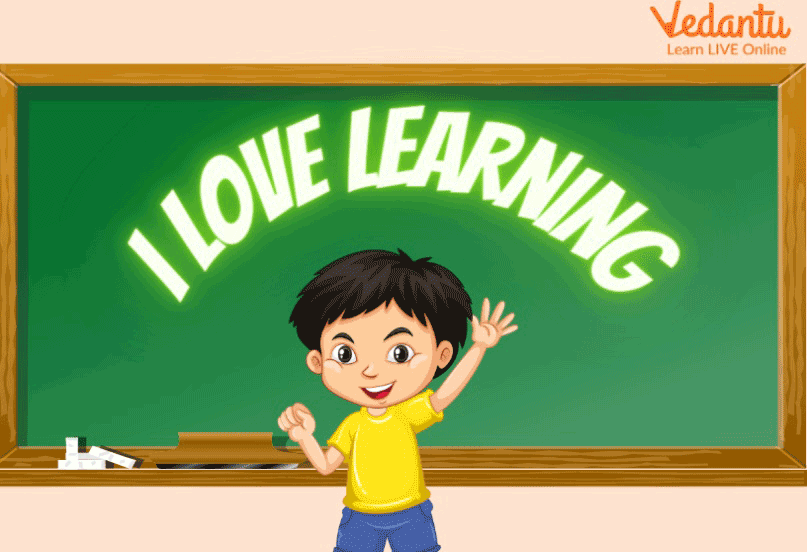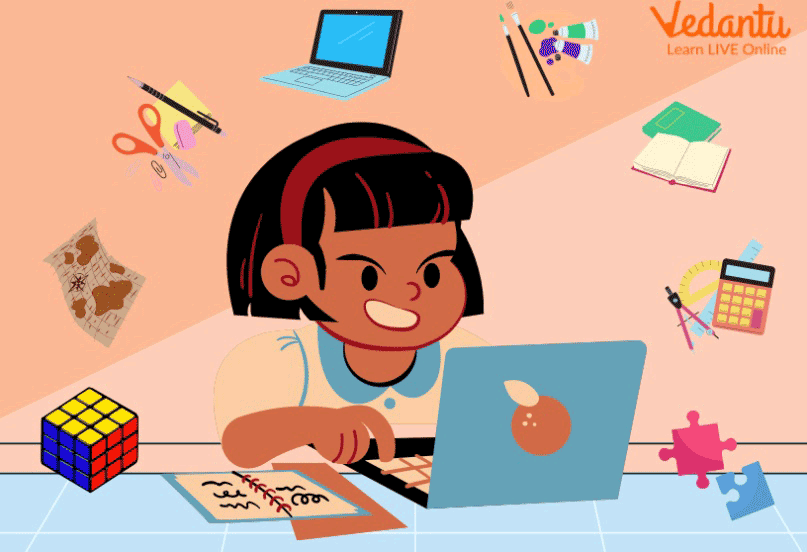




Top Educational Games to Inspire 7-Year-Olds
This article is meant to accelerate kids’ progress in learning through activities like reading, listening, cooking, riding, etc. This article contains 10 activities that will definitely aid in the tricky path of learning for 7-year-olds. We encourage you to read this thoroughly and try to incorporate as many activities as you can into your kids’ day-to-day lives and ensure they are on the right track when it comes to effective learning.

A kid in front of the blackboard with 'I love learning' written on it
List of Activities to Aid in Learning for 7-Year-Olds
Kids can try out the following fun activities to learn new things quickly and easily.
1. Language Activities
Kids should read and try to remember poems. Language activities can help kids develop a love for the language. Kids can spot the words they know or try making up completely new words. For instance, using synonyms, like ‘smoke tube’ instead of ‘chimney’, in the activities can help them improve their vocabulary. Games like Articulate can also help in easy learning for kids.
2. Word Games
You could search words together and then make up your own words! Word games like Scrabble, Bananagrams, and Boggle are excellent games for focusing on mixing letter sound to make words!
3. Memory Activities
Memorising is a useful practice that a kid needs to learn at an early age. It is important in every aspect of life and it simply cannot be avoided. Playing Memory Games can help condition young minds for remembering things better. It is played in groups where everyone sits in a circle. One person can start with a word of their choice and the next person needs to repeat the previous word and say a new word. The person next in the circle has to repeat the two previous words in order and add another new word. If one forgets any word or messes up the order, one is eliminated.
4. Listening Activities
This may sound easy, but kids have a really low attention span. It can be tedious to make them sit and listen to things. Listening games like Simon Says, Statue, and Musical Chair can highly help in easing the process.
5. Action Activities
Games like Twister and Charades can be great for kids to bond with friends and family, and they can learn to better engage their memory in the process.
6. Screen Activities
While it is advisable not to allow children to have a lot of screen time, it can also be a great incentive to make kids learn new things from the internet. Since kids are not allowed much screen time by parents, they will find anything served to them on the digital screen interesting. So, this can be a great opportunity for parents to engage them in learning new things.
7. Car Journey Activities
Car journeys can be boring, so it is perfect for engaging kids in fun activities during car journeys. To shoo away the boredom and make a fun learning experience out of it, games like Punch Buggy and Number Plate Game can be played.
8. Reading Together
Parents should read stories and books together with their kids so that the kids get a source of encouragement. Also, the words and sentences resonate and are retained better by kids when they read together.
9. Maths Activities
Various practical applications of mathematics are there to help children remember the basics of maths. Parents may encourage kids to learn operations of maths through various day-to-day experiences. Addition and subtraction should be taught while shopping, multiplication, and division can be taught while calculating the total cost of multiple items of the same kind or while splitting the bill among a few people.
10. Cooking Together
Cooking is a skill that most kids enjoy (of course under the supervision of parents or guardians). It should be considered as a life skill and should not be left unlearned for a later age. Simple recipes like sandwiches and fruit salads can be easy to learn and fun to make!

Kid learning from different daily activities
Conclusion
Reading and incorporating these fun and useful activities in the lives of your 7-year-olds will surely be beneficial and make them quick learners of healthy habits and traits in the journey of learning and education.
FAQs on Engaging Learning Activities for 7 Year Olds
1. What are some engaging indoor learning activities for a 7-year-old on a rainy day?
On a rainy day, you can keep a 7-year-old engaged with several fun indoor activities. A great option is building with blocks or LEGOs to develop spatial reasoning and creativity. You can also try simple science experiments with household items, like a vinegar and baking soda volcano. Another idea is to stage a puppet show or create a story together, which boosts imagination and language skills. For a quieter activity, consider using some fun worksheets for kids to practise maths or English concepts.
2. What are some fun word games that help improve a 7-year-old's vocabulary?
Word games are an excellent way to expand a child's vocabulary and spelling skills. Some effective options for a 7-year-old include:
- Scrabble Junior: A simplified version of the classic game that helps with word formation and spelling.
- Bananagrams: A fast-paced game where players form their own crossword grids, encouraging quick thinking.
- I Spy with a Twist: Instead of colours, use descriptive words (e.g., "I spy with my little eye something that is shiny").
- Storytelling Prompts: Give your child three random words and ask them to create a short story using all three. This enhances both creativity and vocabulary.
These games make English learning for kids feel like playtime rather than a chore.
3. According to the NCERT/CBSE guidelines, what should a 7-year-old be learning academically?
A 7-year-old, typically in Class 1 or 2, should be developing foundational skills across several subjects. Key learning areas include:
- English: Reading simple stories, writing complete sentences, understanding basic grammar (nouns, verbs), and building a core vocabulary.
- Mathematics: Counting up to 100 or beyond, simple addition and subtraction, understanding place value (ones, tens), and identifying basic geometric shapes.
- Environmental Studies (EVS): Learning about family, the neighbourhood, plants, animals, and the importance of keeping the environment clean.
- Creative Arts: Developing fine motor skills through drawing, colouring, and crafting activities.
These skills are part of a broader curriculum designed to encourage holistic development, as seen in the Year 2 English framework for 6 to 7-year-olds.
4. How can I find free educational activities for my 7-year-old at home?
You don't need expensive materials to create valuable learning experiences. Many free activities use everyday household items. For example, you can practise math skills by counting coins or measuring ingredients while cooking. A nature walk in a local park can become a science lesson about plants and insects. Reading library books is a fantastic free way to improve literacy. You can also turn household waste into art projects, which teaches the importance of recycling for kids.
5. Why is storytelling such a powerful learning tool for a 7-year-old?
Storytelling is more than just entertainment; it's a critical tool for cognitive development. When a 7-year-old listens to or creates a story, they are engaging multiple brain functions. It enhances their imagination and creativity, improves listening and concentration skills, and expands their vocabulary. Furthermore, stories teach cause and effect, empathy, and different perspectives. Encouraging a child to write their own stories is a key part of developing their language abilities, as explored in writing exercises for 7 to 8-year-olds.
6. How can everyday chores be turned into fun learning moments?
Everyday chores offer a practical way to reinforce academic concepts. Here’s how you can transform them:
- Cooking and Baking: Let your child help measure ingredients to learn about fractions and units (maths). Reading a recipe out loud improves reading fluency.
- Sorting Laundry: Ask them to sort clothes by colour, size, or family member. This teaches categorisation and logical reasoning.
- Grocery Shopping: Have them help find items on a list (reading), weigh produce (maths), and count the total number of items in the cart. This builds excellent number sense in a real-world context.
7. What is the importance of balancing online learning games with hands-on activities?
While online educational games can be great for reinforcing specific skills like math facts or spelling, they should be balanced with hands-on activities. Hands-on learning is crucial for developing fine motor skills, problem-solving abilities, and creativity. Activities like building, painting, or playing with clay allow children to physically manipulate objects, which deepens their understanding. A healthy balance ensures that a child develops both their digital literacy and their physical and social skills through tangible, real-world interaction.
8. How do learning activities for a 7-year-old build upon skills learned at age 5?
Learning at age 7 is about building complexity and depth on the foundational skills acquired earlier. For example:
- Literacy: A 5-year-old learns to recognise letters and sound them out. A 7-year-old uses this knowledge to read simple sentences and begin writing their own thoughts.
- Numeracy: A 5-year-old masters counting and number recognition. A 7-year-old applies this to perform basic addition and subtraction and understand concepts like place value.
- Motor Skills: A 5-year-old's scribbling evolves into a 7-year-old's ability to form letters correctly and draw more detailed pictures.
This progression shows a shift from basic recognition to active application and problem-solving.















